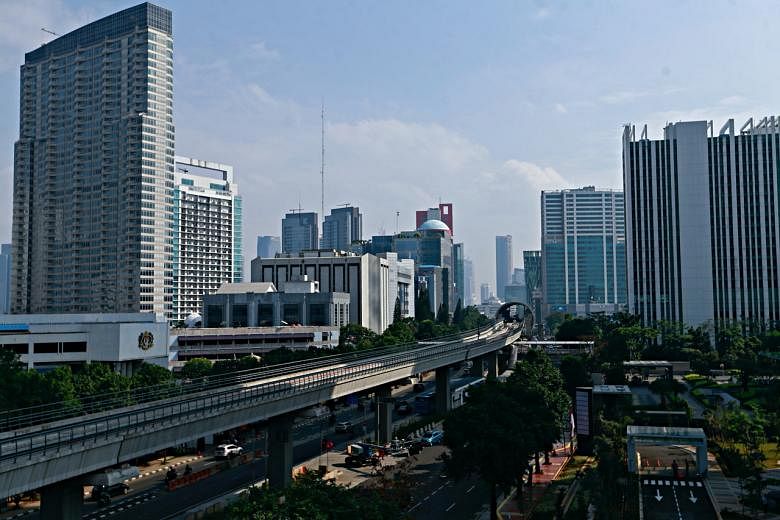JAKARTA - When Mr Anggara Kasih Nugroho Jati, 36, was rapidly expanding his confectionery business, taxes were the last thing on his mind.
Instead, he played cat and mouse with the taxman to plough resources back into the business, which was aimed at tourists. Among other things, he sold Lapis Bogor Sangkuriang, a layered cake named after the hilltop town south of Jakarta, or Bolu Susu Malang, a sponge cake made from apples and sweet potatoes from an East Java city.
All delicious and fetchingly packaged to appeal to visitors, who snapped them up for family back home.
But now, as Mr Anggara mulls a possible initial public offering, he is cleaning up the books for his company, PT Agrinesia.
"Now I've been through it all," he told The Straits Times. "If they want to audit my reported income, then go for it."
After racking up debt to pump-prime South-east Asia's biggest economy during the pandemic, the government of President Joko Widodo is desperate to boost government revenues.
But the government is in a bind: Crack down too hard and you risk choking off a fledgling recovery. Go too easy and you spook capital markets.
Tax professionals say they have seen an uptick in inquiries from clients seeking help to fend off potential audits.
"There are an increasing number of cases of clients seeking assistance," said Mr Bambang Suprijanto, a Jakarta-based accountant at tax consultancy EY.
A lot is at stake for the government as the gap between spending and revenues widens.
Like many countries, Indonesia's tax take - already low by international standards - shrunk last year as a percentage of gross domestic product (GDP). In 2020, revenues dropped to less than 10 per cent from 11.6 per cent the year earlier.
By comparison, the Philippines' tax take during the first six months of 2021 was just shy of 15 per cent despite the pandemic.
Last month, the government in Jakarta said that it would extend a programme to sell bonds to its central bank, which bought them with - effectively - printed money and agreed to pay below market interest rates. While borrowing will ease next year, Indonesia's budget deficit will still weigh in at 4.8 per cent of GDP by the end of 2022 - well north of the 3 per cent legal limit.
Analysts were already concerned before the government unveiled its plans.
In July, with Covid-19 infections at a record, debt ratings agency Moody's warned that the pandemic may "challenge government plans to reduce the fiscal deficit to pre-pandemic levels", stopping short of putting Indonesia on a negative watch.
Moody's rates Indonesia's debt one notch above its lowest investment grade with a "stable" outlook.
Even so, a Bill on raising taxes, introducing new ones and tightening loopholes is facing opposition in Parliament. The measures being proposed include a minimum one per cent so-called alternative minimum tax on gross earnings even for firms reporting a loss. The Bill also seeks to hike by 2 percentage points to 12 per cent the value-added tax (VAT).
The Bill would require smaller companies earning at least 1.8 billion rupiah (S$171,000) in revenue to charge the VAT. That is less than half the previous threshold of 4.8 billion rupiah. The government is also mulling a carbon tax of 75,000 rupiah a tonne.
Analysts say time is running out for the Bill, with Mr Widodo nearly midway through his second and final term as president.
"Capital markets are going to need to see revenues pick up again," Mr Joseph Incalcaterra, chief Asean economist for HSBC in Hong Kong told ST.
"If the tax Bill is not completed now, we may have missed the opportunity before the next election."
That leaves the tax authorities needing to be more thorough with the tax base they have.
In addition to a tax amnesty in 2016, the country is now offering a second partial reprieve, waiving penalties for assets accumulated over the three years to 2019.
Experts say that high-net-worth individuals and companies with cross-border transactions in particular are feeling the pinch.
Fast-changing regulations, such as new tax rules in last year's omnibus job creation law, including discounts for research and development, residency for tax purposes and changes to the VAT, have also triggered inquiries, said Mr Bambang.
"(The changes) are giving our clients a lot to think about," he told ST.
The tax authorities say they are better equipped now to deal with tax evasion, armed with data, training and international agreements that make it easier to unearth undeclared income squirrelled away here and abroad.
The directorate general of taxation told ST in e-mailed comments that it has opened 18 offices, and introduced case workers and specialist officers to oversee training tax law.
In 2018, Indonesia signed on to the The Automatic Exchange of Information, which allows the Indonesian authorities to peer into holdings of its residents held in more than 80 jurisdictions abroad.
"The Directorate General of Taxes puts in the maximum effort to make the tax administration system in Indonesia comparable to the tax administration systems of developed countries," according to the statement.
Ms Cindy Salaki, a partner at Jakarta-based tax consultancy Salaki & Salaki, says the added scrutiny has led to sleepless nights for some clients.
During the 35 years since Ms Salaki's mother started the family-run consultancy, clients would go against its advice and hide assets and under-report income.
Queries from clients saying they have had requests for more information from the tax office have surged, she said.
"This is bad news for people with the old way of thinking," Ms Salaki said of the increased scrutiny. "You could hide things before and not get caught. Now, you can't."


